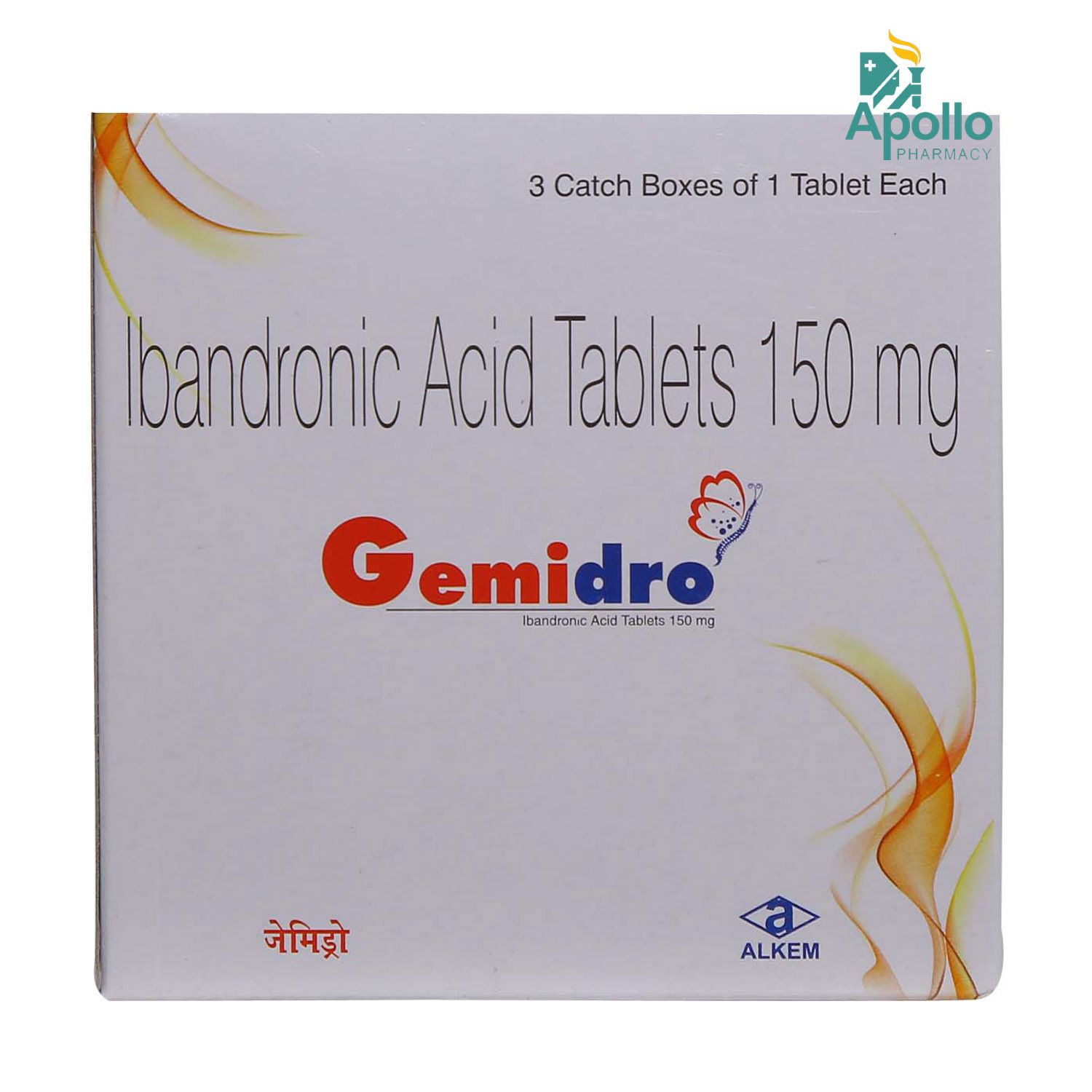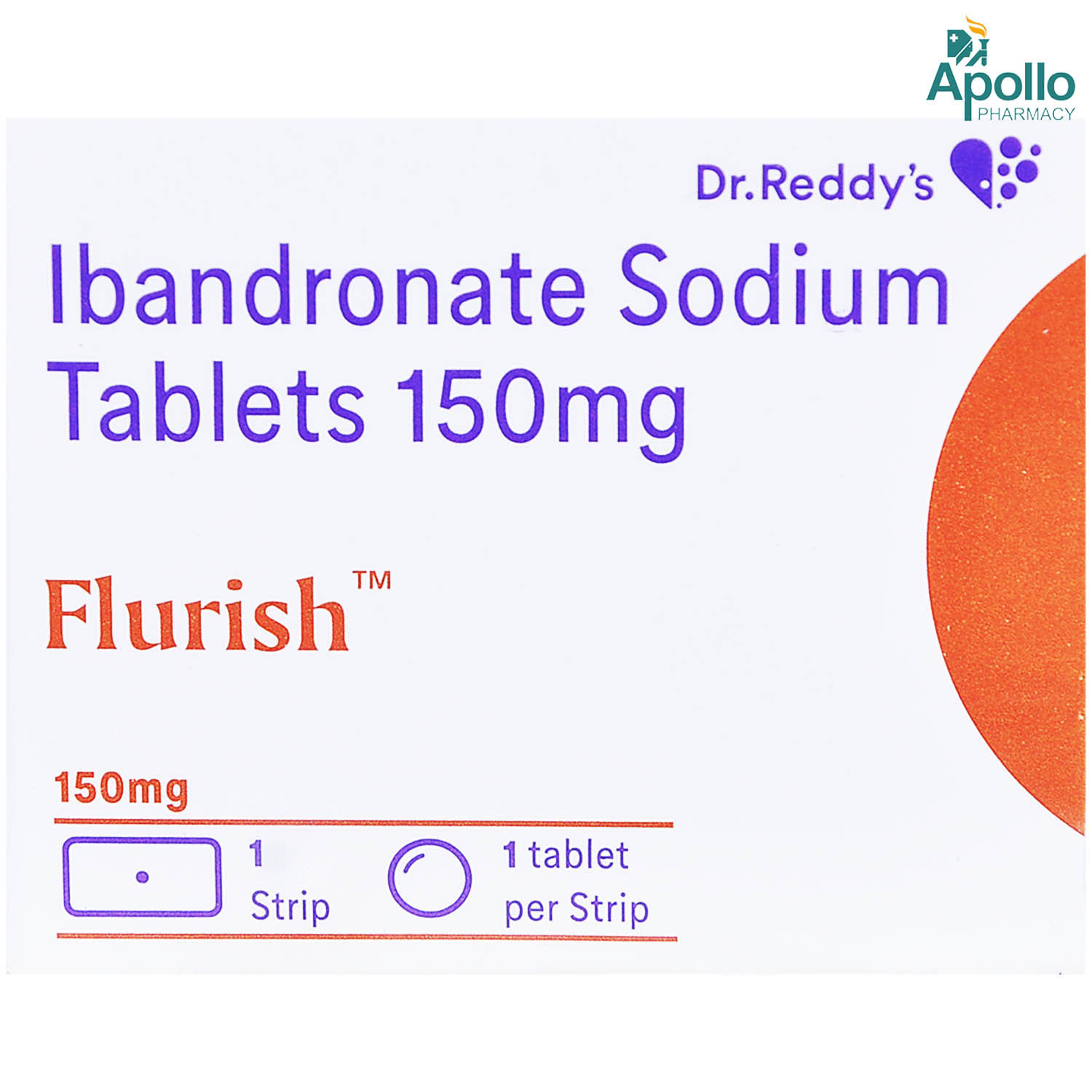Ibandronic Acid
About Ibandronic Acid
Ibandronic Acid belongs to a group of medications called 'bisphosphonates' used to prevent post-menopausal osteoporosis. It is indicated in adults for the prevention of skeletal events such as pathological fractures and bone complications requiring surgery or radiotherapy in patients with bone metastases or breast cancer.
Ibandronic Acid contains 'Ibandronic acid', which suppresses the activity of osteoclasts and makes the bone stronger. It lowers the risk of getting a fracture and reduces pain in the bones. Ibandronic Acid may reverse bone loss by increasing bone mass and stopping more bone loss.
Take Ibandronic Acid exactly as prescribed by the doctor. In some cases, Ibandronic Acid may cause side effects like heartburn, muscle pain, indigestion, headache, and nausea. Most of these side effects of Ibandronic Acid do not require medical attention and gradually resolve over time. However, if the side effects persist or worsen, consult your doctor.
Do not lie down for 60 minutes after taking Ibandronic Acid, and avoid eating your first food of the day for at least 60 minutes after taking Ibandronic Acid.Consult your doctor if you are pregnant or breastfeeding. Ibandronic Acid is not recommended for children below 18 years as safety and effectiveness have not been established.
Uses of Ibandronic Acid
Medicinal Benefits
Ibandronic Acid belongs to a group of medications called 'bisphosphonates' used to prevent post-menopausal osteoporosis. It is indicated in adults for the prevention of skeletal events such as pathological fractures and bone complications requiring surgery or radiotherapy in patients with bone metastases or breast cancer. Ibandronic Acid may also be used to lower hypercalcemia (higher levels of calcium in the blood). Ibandronic Acid contains 'Ibandronic acid', which suppresses the activity of osteoclasts and makes the bone stronger. It lowers the risk of getting a fracture and reduces pain in the bones. Ibandronic Acid may reverse bone loss by increasing bone mass and stopping more bone loss.
Directions for Use
Storage
Side Effects of Ibandronic Acid
- Back pain
- Heartburn
- Abdominal pain
- Diarrhoea
- Headache
- Myalgia (muscle pain)
- Indigestion
Drug Warnings
Do not take Ibandronic Acid if you are allergic to any of its components, have problems with the oesophagus, cannot sit or stand upright for at least 60 minutes, or have low calcium levels in the blood. Inform your doctor if you have problems with swallowing, stomach or digestive problems, malabsorption syndrome, kidney or liver problems, or if you plan to have teeth removal or dental surgery. Consult your doctor if you are pregnant or breastfeeding. Ibandronic Acid may cause problems with the oesophagus, low blood calcium levels, bone, joint, or muscle pain, osteonecrosis (severe jaw bone problems), and unusual thigh bone fractures. Keep your doctor informed about your health condition and medications to rule out any interactions/side effects.
Drug Interactions
Drug-Drug interaction: Ibandronic Acid may interact with antacids, pain killers (aspirin), and NSAIDs.
Drug-Food interaction: Do not take Ibandronic Acid with mineral water, coffee, tea, soda, or juice.
Drug-Disease interaction: Inform your doctor if you have problems with the oesophagus, hypocalcemia, or severe renal problems.
Drug-Drug Interactions Checker List:
Safety Advice

Alcohol
cautionIt is not known if alcohol affects Ibandronic Acid. Please consult your doctor.

Pregnancy
cautionIbandronic Acid belongs to pregnancy category C. Consult your doctor if you are pregnant. Your doctor will prescribe Ibandronic Acid only if the benefits outweigh the risks.

Breast Feeding
cautionIt is not known if Ibandronic Acid passes into breast milk. Consult your doctor before taking this medicine if you are breastfeeding.

Driving
safe if prescribedIbandronic Acid has no or negligible influence on the ability to drive.

Liver
cautionPlease consult your doctor before taking Ibandronic Acid if you have a liver impairment or any concerns regarding this.

Kidney
cautionIbandronic Acid is not recommended for people with severe renal impairment. Please consult your doctor if you have kidney impairment or any concerns regarding this.

Children
unsafeIbandronic Acid is not recommended for children below 18 years as safety and effectiveness have not been established.
Habit Forming
Diet & Lifestyle Advise
- Eat a balanced diet rich in calcium and vitamin D.
- Avoid smoking and heavy alcohol consumption.
- Do walking, weight-bearing, and strength-training exercises.
- Include fresh fruits, vegetables, and whole grains in your diet.
- Limit your intake of caffeine.
Special Advise
- If you miss a dose of Ibandronic Acid, do not take the missed dose later in the day. Consult your doctor for instructions.
- Maintain a gap of one hour between Ibandronic Acid and other medicines such as calcium supplements, indigestion tablets, or vitamins. However, you are advised to consult your doctor before taking other medicines with Ibandronic Acid.
Patients Concern
Disease/Condition Glossary
Osteoporosis: It is a bone disease that causes bone weakness and thinning by lowering bone density. Bones become weaker and more prone to breaking as their density decreases. Women are more likely than men to develop osteoporosis after menopause because their ovaries stop producing oestrogen (a female hormone) needed to keep bones healthy. Bone loss occurs after menopause, weakening bones and making them more likely to break. Back pain caused by a fractured or collapsed vertebra, gradual loss of height, a stooped posture, and bones that break much more quickly than expected are all signs and symptoms.
FAQs
Ibandronic Acid suppresses the activity of osteoclasts and makes the bone stronger. It lowers the risk of getting a fracture and reduces pain in the bones.
Do not lie down for 60 minutes after taking Ibandronic Acid, and avoid eating your first food of the day for at least 60 minutes after taking Ibandronic Acid. After taking Ibandronic Acid, wait for at least 60 minutes before you lie down; you may sit, walk, stand, or do normal activities like reading.
Ibandronic Acid may cause osteonecrosis (bone damage) of the jaw. A full dental check-up is advised before starting Ibandronic Acid. Consult your doctor immediately if you experience symptoms such as pain, swelling, redness of the gums, numbness or heaviness in the jaw, and loose teeth. If you are undergoing any dental work, inform the doctor that you are taking Ibandronic Acid.
Ibandronic Acid may cause unusual fractures of the thigh bone. Consult your doctor if you experience unusual pain in the hip, thigh or groin.
Ibandronic Acid may lower the calcium levels in the blood. Call your doctor immediately if you notice symptoms such as spasms, twitches, or cramps in the muscle, numbness, or tingling sensation in the fingers, toes or around the mouth.
Ibandronic Acid may cause problems with the oesophagus. To prevent this, take Ibandronic Acid precisely as prescribed by the doctor. Consult your doctor if you have chest pain, heartburn, trouble or pain while swallowing.







